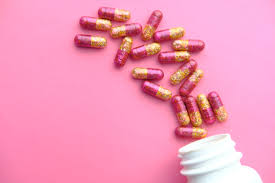Sometimes you may follow several steps to treat acne and apply the necessary creams, but you notice that these pimples did not disappear! Therefore, the doctor may prescribe you to take oral pills in order to ensure the disposal of facial pimples. What is its role? What are its side effects? And other questions, the answers to which we will reveal to you in this article, so that you are fully aware of this topic.

A complete guide on acne treatment pills
1- When should acne pills be used?
In fact, you should resort to pills to treat acne, when the pimples do not disappear with creams and you notice that they are spread all over your body, such as the shoulders and back. These pimples are very inflamed, and this is known as severe acne. From here, the doctor prescribes oral medications that improve the skin from the inside out.
2- How many times a day should I take acne pills?
Some medications are taken orally once a day, while others are taken twice a day, depending on the type of pill. But in either case, you should take your dose at the same time every day.
3- When did you start noticing the effectiveness of acne treatment pills?
You will start noticing the results after about a month and a half, but in some cases it may take more time for acne pills to take effect.
4- What is the prescribed period for taking acne pills?
You must take pills to treat pimples from 3 to 6 months, not more, and this is what your doctor will prescribe for you.
5- Types of acne pills
Anti-inflammatory pills
Anti-inflammatory pills are used to treat pimples, in order to help fight bacteria and infection from the inside out. Antibiotics are most commonly used in combination with topical medications when gels and creams alone aren’t improving your condition.
Aldactone
Aldacatone is another medicine intended for adult women. It is used in certain circumstances to treat hormonal fluctuations that contribute to the spread of pimples.
akutan
Accutane works to treat severe acne by shrinking the sebaceous glands, which are small glands near hair follicles that produce oil. This reduces the amount of oil on the skin, which contributes to alleviating and treating inflamed pimples.
Pills
This type of drug is able to reduce sebaceous gland secretions by suppressing androgen hormones. Birth control pills may be an ideal option for women with acne that coincides with the menstrual cycle.
6- Side effects of taking acne pills
- upset stomach
- Allergy
- dizziness
- dry skin
- mood change
- High cholesterol level
Note: While you are taking acne pills, you should not become pregnant.

